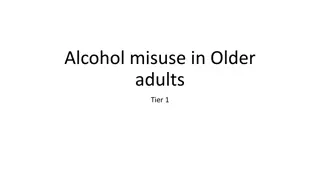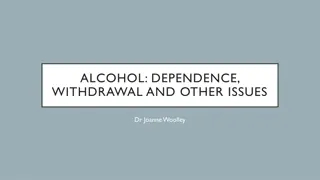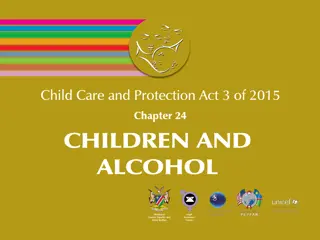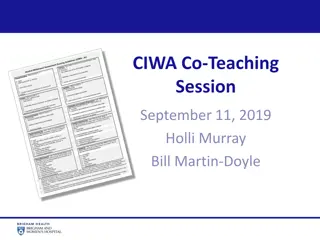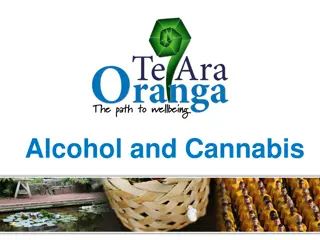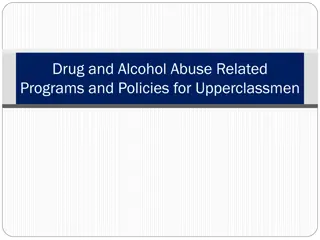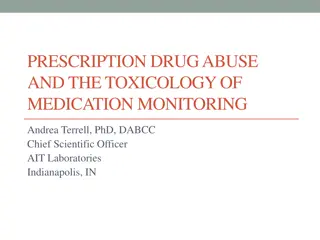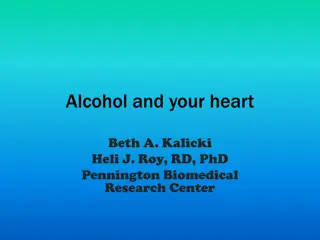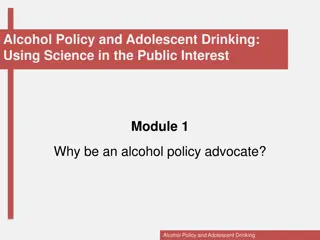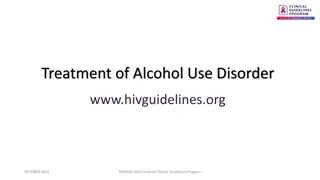The Role of Nutrition in Treating Alcohol Abuse
This presentation emphasizes the importance of nutrition in the treatment of alcohol abuse, with a focus on how Registered Dietitians can contribute to the care process. It outlines the process of nutrition diagnosis, interventions, goals, and evaluation methods tailored to individuals with alcohol abuse. Considerations for interacting with clients, including cognitive, scope of practice, home life, anthropometric, and nutrition factors, are also discussed.
Download Presentation

Please find below an Image/Link to download the presentation.
The content on the website is provided AS IS for your information and personal use only. It may not be sold, licensed, or shared on other websites without obtaining consent from the author.If you encounter any issues during the download, it is possible that the publisher has removed the file from their server.
You are allowed to download the files provided on this website for personal or commercial use, subject to the condition that they are used lawfully. All files are the property of their respective owners.
The content on the website is provided AS IS for your information and personal use only. It may not be sold, licensed, or shared on other websites without obtaining consent from the author.
E N D
Presentation Transcript
Treating Alcohol Abuse A Collaborative Approach to Care July 14, 2018 * Tex-CHIP Training Series
Role of Nutrition & Lifestyle in Prevention/Management of Alcohol Abuse
Understanding Provider Role in Treating Alcohol Abuse Registered Dietitian s focus is on the nutrition diagnosis rather than medical or psychiatric diagnosis Nutrition diagnoses are written as a PES statement which identifies the nutrition Problem, it s Etiology, and the Signs/ Symptoms which point to that problem Example: Underweight related to inadequate energy intake as evidenced by BMI of 14 and reported intake of <50% of estimated calorie needs.
Understanding Provider Role in Treating Alcohol Abuse Interventions, goals, and evaluation methods are then tailored to the nutrition diagnosis Example: 1) Educated client on estimated calorie needs 2) Recommended prescription to PCP for oral nutrition supplement once daily to help meet estimated needs Most PES statements in this population are surrounding energy balance, weight status and history, hydration status, and nutrient deficiencies
Considerations when Interacting with Clients Cognitive Considerations: Impaired cognition makes accuracy or dietary recalls questionable Be aware of the emotional fragility of client and caregiver Scope of Practice Considerations: Redirect conversations to stay within bounds of RD s Scope of Practice Home Life Considerations: Does client have a support system or enablers? Finances, available tools, & surrounding community play large roles in recovery
Considerations when Interacting with Clients Anthropometric Considerations: Collect information on height, weight, weight history, and Body Mass Index Review recent and past lab values to identify any areas of concern (i.e. Liver disease, nutrient deficiencies, anemia, etc.) Conduct a Nutrition-Focused Physical Assessment to help identify malnutrition Nutrition Considerations: Collect a 24-hour dietary recall from client and/or caregiver Include information on vitamin or oral nutrition supplement use
Our Treatment Plan Healthcare Domain: Nutrition Provider: Dietitian Goals: a) Abstaining from alcohol Interventions: a) Assist client with revisiting coping strategies to manage triggers of alcohol consumption Objective: Decrease in alcohol abuse as indicated by client report of: (a) Reduction in frequency and volume of alcohol consumption as compared to initial assessment and/or last follow-up a) Energy and fluid balance by consuming foods and non-alcoholic beverages that provides 90-110% of estimated needs b) Educate client on estimated calorie and hydration and provide sample culturally-relevant menu plans that meet client s needs b) Improved nutrition status based on weight maintenance and energy and fluid intake meeting >75% of estimated needs b) Micronutrient deficiencies corrected, particularly so that serum B-vitamin, iron, and potassium levels are within normal limits c) Compliance with vitamin and nutrition supplement orders as prescribed by PCP and/or RD c) Recommend and/or order prescriptions for multivitamin and/or oral nutrition supplements c) Prevent further damage through dietary management as able (i.e. liver disease, hypertension, anemia, etc.) d) Offer dietary education on management of complications of alcohol abuse as able
Measuring Outcomes/ Success Weight maintenance or weight gain without increase in consumption of alcohol-containing beverages Increased reports of energy and fluid intake according to 24- hour diet recall or food journal Reports of decreased alcohol intake Patient compliance with supplement use as prescribed Lab values show micronutrient levels improving or within normal limits
Communication from Counselors Helps gauge motivation and readiness to change Provides insight on support system and home life that I may not have received from assessment conversations Offers valuable information on progress being made, resources being sought, and emotional and mental state of client Often times, nutrition status is not top-of-mind for a client seeking or receiving care for alcohol abuse



